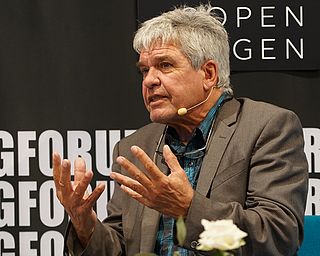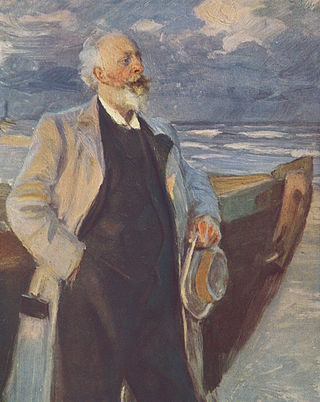Related Research Articles
The Tagea Brandts Rejselegat is a Danish award to women who have made a significant contribution in science, literature or art. The grant, which is given without application, was created and endowed by Danish industrialist Vilhelm Brandt (1854–1921) in 1905 in honor of his wife, Tagea Brandt. It is awarded annually on 17 March, her birthday. The charter of 1922 provides that it shall be given to outstanding women in science, art, music, literature and theater arts. The intent is for the awardee to both broaden her horizons while promoting Danish society abroad, and to benefit from vacation and rest time.

Naja Marie Aidt is a Danish-language poet and writer.
The Norwegian Academy Prize in memory of Thorleif Dahl is awarded annually by the Norwegian Academy for Language and Literature. The prize is given in recognition of the eminent literature, poetry or nonfictional work written in riksmål, or to the foremost translation to riksmål of fiction or nonfiction. Since 1991 the prize has been 100,000 kroner

Ib Michael is a Danish novelist and poet. His writing style has been described as magic realism.
The Eckersberg Medal is an annual award of the Royal Danish Academy of Fine Arts. It is named after Christoffer Wilhelm Eckersberg, known as the father of Danish painting.
Kirsten Thorup is a Danish author.
Events in the year 1920 in Norway.
Fritt Ord Award consists of two prizes awarded by the Fritt Ord Foundation. Two prizes are awarded in support of freedom of speech and freedom of expression; the Fritt Ord Award and the Fritt Ord Honorary Award. These are awards are distributed annually during the month of May in connection with the anniversary of the liberation of Norway at the end of World War II in May 1945.

Danish Academy is an independent organisation founded in 1960 by a circle of Danish intellectuals "to promote Danish esprit and language, especially within the field of literature". It has up to 20 members, currently 18, and is based at Rungstedlund, the former home of author Karen Blixen who was one of the original members. The Academy runs a number of annual literary prizes including most notably its Grand Prize.

De Gyldne Laurbær is a Danish literature award, which was established in 1949. The award is handed by The Committee De Gyldne Laurbær, formerly Boghandlerklubben. The prize is given annually in February or March. Originally the award was a laurel wreath, a golden pin with an inscription, some money and a book gift worth 2500 DKK. Today the award is a laurel wreathe, a diploma and a book gift worth 2500 DKK. The award is handed at a ceremony arranged by the publishing house which has published the winning book and by the Committee De Gyldne Laurbær. Early in January every year the committee sends out ballot to all the Danish bookshops, which then give their vote for a Danish book which was published the year before. An author can only win The Golden Laurel once-in-a-lifetime, so the bookshops can not vote for an author who has already won the prize once before. The winner is usually one of the bestsellers among the Danish books. On the day when it is decided who wins the Golden Laurel, the president of the Committee of The Golden Laurel informs the winner about the award, while journalists follow the event.
The Ministry of Culture's children book prize from Denmark is a prize, which is given in order to honor a special effort for the Danish children's and youth book of high artistic quality. The award can be given either for a single title or for a whole work of an author. Along with the honor follows DKK 30.000, which partially comes from the "tipsmidler" (money from "Danske spil's" gambling, in Denmark a 66,44% of the money of gambling like lottery goes to cultural work and various kind of charity. In 2011 the "tipsmidler" gave a 1,5 billion Danish kroner profit which the government ministries must give to charitable purposes.
The Danish Critics Prize for Literature is an annual Danish literature award. It was established in 1957 by the Danish Publishers Association. Since 1971 the award has been made by the Danish Literature Critics Association after a vote by members. The award currently carries a prize of DKK 30,000. The Association also awards the Georg Brandes-Prize.

The Søren Gyldendal Prize is a Danish literary award, which was established in 1958 by Gyldendal Publishing House. The prize is awarded annually on 12 April, the anniversary of the birthday of Søren Gyldendal (1742-1802) founder of Gyldendal Publishing House. In 1958 the prize was DKK 10,000. In the period 1991 to 2000 it was increased to DKK 100,000. From 2001 to 2008 it was DKK 150,000. Since 2009 it has been DKK 200,000.
The Holberg Medal is an award to a Danish author of fiction or writer on science. It is an appreciation of a literary or scientific work or of the award winner's authorship as a whole. The prize is often awarded on 3 December, the birthday of Ludvig Holberg. The first award was given in 1934 in connection with the 40th anniversary of the Danish association of authors.
The Lauritzen Award is a Danish film award which is handed every year to a female and a male Danish actor once a year by the Lauritzen Fonden.
The Bodil Award for Best Actor in a Supporting Role is one of the merit categories presented by the Danish Film Critics Association at the annual Bodil Awards. Created in 1948, it is one of the oldest film awards in Europe, and it honours the best performance by an actor in a supporting role in a Danish produced film. The jury can decide not to hand out the award, which happened numerous times between 1950 and 1985. Since 1986 it has been awarded every year.

Drachmannlegatet is a Danish literary award founded in 1917, based on funding derived from the entrance fee to Drachmanns Hus in Skagen. The winner is announced annually on 9 October, the anniversary of the birthday of Danish writer and painter Holger Drachmann (1846–1908).
Inger Marianne Larsen is a Danish poet, writer, and novelist.
The Harald Mogensen Prize is a Danish literary award for detective novels awarded by the Danish Criminal Academy. It was founded in 2006 and was first awarded in 2007. It is named after Danish author, editor, journalist and critic Harald Mogensen who was awarded The Danish Criminal Academy diploma in 1993.
References
- ↑ Litteraturpriser.dk Akademiets store Pris
- ↑ Danskeakademi.dk Archived 2020-02-15 at the Wayback Machine DET DANSKE AKADEMIS STORE PRIS